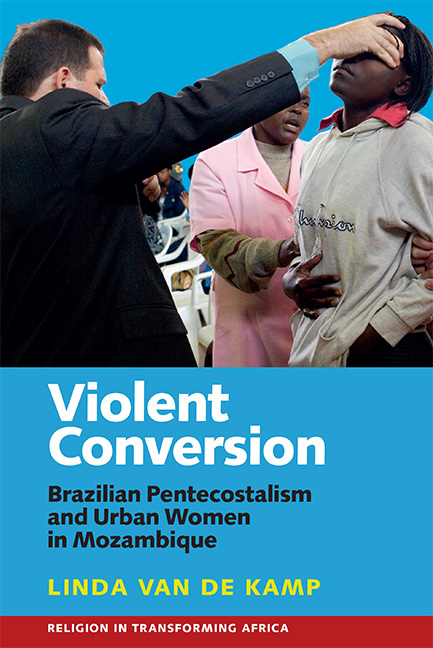Book contents
- Frontmatter
- Contents
- List of Illustrations
- Acknowledgements
- Introduction
- 1 Gender, Family and Social Transformations in Maputo
- 2 Transnational Spaces of Conquest
- 3 Moving Frontiers: the Generational Trajectories of Pentecostal Women
- 4 Converting the Spirit Spouse
- 5 Terapia Do Amor: Confrontational Public Love
- 6 ‘Holy Bonfires’ and Campaigns
- Conclusion: Violent Conversion
- Bibliography
- Index
5 - Terapia Do Amor: Confrontational Public Love
Published online by Cambridge University Press: 24 October 2017
- Frontmatter
- Contents
- List of Illustrations
- Acknowledgements
- Introduction
- 1 Gender, Family and Social Transformations in Maputo
- 2 Transnational Spaces of Conquest
- 3 Moving Frontiers: the Generational Trajectories of Pentecostal Women
- 4 Converting the Spirit Spouse
- 5 Terapia Do Amor: Confrontational Public Love
- 6 ‘Holy Bonfires’ and Campaigns
- Conclusion: Violent Conversion
- Bibliography
- Index
Summary
Every Saturday evening, the Universal Church organises terapia do amor (Therapy of Love, known as terapia or therapy) sessions in several of its buildings. The therapy is a public meeting that resembles a church service but is dedicated to the subjects of marriage, love and sexuality. Thousands of people participate every week, and most of them are young (aged 15 to 35) and female. The heart of the therapy lies in learning how to express love in public. An illustration of this is when the pastor asks couples to come forward and stand in front of the podium. The pastor then says to them, ‘Now apologise to each other for the mistakes you have committed towards each other.’ Romantic music plays and the pastor and his wife stand on the stage as he continues, ‘Embrace each other, kiss your partner and say: “I love you.”’ The pastor and his wife do the same and start praying for the couples in front of them.
In the centre of Maputo, as in other African cities (see Spronk 2002 for Kenya), it is unusual and often considered shocking to openly express affection to your partner in the presence of others and to talk about sexuality in a public forum (Manuel 2011). Using force, Pentecostals are undoing any ‘secrecy’ about sexuality and are introducing particular concepts and practices of love. This chapter examines this public training of the body in ways of love, such as embracing and kissing, during Brazilian Pentecostal counselling sessions on love and sexuality that demonstrate the confrontational techniques that form a part of Pentecostal conversion. The terapia do amor serves as a key example.
The role of religion in education about the family, marriage and sexuality in Africa is not new. There is a large body of literature on colonial Christian missions and the shaping of new identities in relation to work, health, family, sexuality and marriage (Comaroff and Comaroff 1991, 1997; Ranger 1992). Nonetheless, the era of AIDS prevention and treatment programmes has created a re-christianisation of the public discourse and the debate on sexuality and marriage, reflecting the increasing influence of faith-based organisations (FBOs) in AIDS programmes (Prince et al. 2009). This has stimulated renewed scholarly attention for religion and counselling on sexuality and marriage in Africa (Becker and Geissler 2009; Burchardt 2011; Moyer et al. 2013; Prince et al. 2009; van Dijk et al. 2014).
- Type
- Chapter
- Information
- Violent ConversionBrazilian Pentecostalism and Urban Women in Mozambique, pp. 131 - 164Publisher: Boydell & BrewerPrint publication year: 2016

